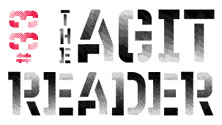
Exit Dreams
In the Red
The Hunches are finished, and we all should be shedding tears over their departure. With the release of their third and final record, the fittingly titled Exit Dreams, Portland’s most visceral rock band will be ending an eight-year run of chaotic live sets and blown-out garage shrapnel put to record. We’ve waited years for its release, and though the arrival is bittersweet, Exit Dreams feels like one gigantic celebration, as if an enormous weight has been lifted from the members’ shoulders for merely existing.
Exhibit A: “Not Invited”, the album’s standout, a mid-tempo tribute to the joys of drinking at home, alone, listening to records. The song comes straight from singer Hart Gledhill’s soul, complete with his backing “ahs” and “oohs,” joined at the hip with Chris Gunn’s insane riffs and the rhythm’s steady, simplistic pound. When Hart tells us, “You’re not allowed in,” we can’t help but feel for the guy, too drunk to realize we’ve all been there with him from the start. It’s the most immediately beautiful moment of the Hunches’ entire discography, each piece perfectly whole, easily Gledhill’s most confident vocal performance to date.
The rest of the album also plays more varied than their two previous LPs, 2002’s straightforward swamp burner Yes, No Shut It and their confidant, focused sophomore album, Hobo Sunrise, from 2004. Exit Dreams is more adventurous, more powerful, with better songwriting and pitch-perfect production. Not to slag the other two—because they’re both great intense rock records—but this one just has that “epic” feel at every turn. The chant-along verses of the opener “Actors” lead to an upending, fuzzed/fucked solo, insane howls and a one-note piano, before ending in a Barrett-era freakout. Next track “Ate My Teeth” uses the same riff sped-up to a more furious tempo, kicking Ben Spencer’s unholy beat into overdrive before spilling into a hot groove enhanced by an unprofessional saxophone.
Their references, usually on full display (the band are said to be the biggest Cheater Slicks fans in existence), are a bit more difficult to lay out this time. You’ll still hear the Slicks and the Stooges, their prime influences, in just about every track, but Exit Dreams introduces a broader palette. Maybe some ESP freakiness (“From This Window”, “Unraveling”) here, a little more JAMC and their British contemporaries than usual there, but on the whole the Hunches have always taken favorites and made them their own, and on this swansong they sound utterly original. Perhaps their only contemporary is the Hospitals, a sort of brother band who now calls Chris Gunn a permanent member. So in that sense, it is a damn shame that Exit Dreams means the end of the Hunches. Nobody sounds like ‘em, and nobody has done it better for the better part of this decade. On the other hand, they’ve exited with about as big a bang as any band could muster these days. On top of that, they’ll never have to face the challenge of topping Exit Dreams, its endless spirit blasting into our heads as the final statement from these four Portlanders.
Doug Elliott

A Fool for Everyone
The Social Registry
New York City native Mike Bones has frequently been labeled a “guitarist’s guitarist” due to the work he’s clocked as a session man and the infrequent pick-up shows that highlight the recent history of the “in-the-know” scene of “the city.” And though the bulk of his past releases failed to show that side of him, A Fool for Everyone is the brutish blues record, trying through first-person narratives and mood to not be a blues record in the strict definition of the term. It dutifully showcases the gift of his fingers and words, woven through bar ballads bruised but realistic.
Aided by a cache of skilled friends who pad his bare-knuckled confessionals with painfully beautiful arrangements—horns and strings add an extra heft that’s not really required but welcome here—Bones is given a parachute for his leap into self-loathing. “One Moment’s Peace” seems his caveat, as he’s “sworn off drugs, and sworn off women,” he’s still unable to get comfortable, and again, perhaps the city’s his only companion. Reminiscent of Lou Reed’s comeback, New York, in the record’s constant ode to the battle-tested urban troubadour, especially in the miniature epic of “I’m an Honest Man, I Kept Repeating,” Bones’ taut solos and slurred croon belie the ho-hum of the song’s standard tempo. While these sweeping productions are striking (“What I Have Left” is particularly moving) Bones could have easily sat alone with his guitar and bled similar results.
Kevin J. Elliott

Love, Hate and Then There’s You
Majordomo
It’s been five years since the Von Bondies broke out of the Detroit music scene with Pawn Shoppe Heart and the energetic anthem “C’mon C’mon” (heard more recently as the theme for Rescue Me on the FX network). But it seems eons ago that the band gained notoriety when frontman Jason Stollsteimer got into possibly one of the only indie rock fights ever, when he and Jack White got into an altercation in their shared hometown.
For those who still might care, the band’s back with Love, Hate and Then There’s You, their third studio album, and while it’s a good effort, it’s decidedly flat—like it wasn’t stored in a cool place. Though the band plays with nearly the same urgency, it’s not clear if the Von Bondies are still as relevant, even though that rock & roll sound of that Detroit scene of that era has largely been replaced by studio slickness. The record was produced by Rick Parker, whose credits include the Black Rebel Motorcycle Club, and by singer-songwriter Butch Walker. The latter’s credentials include working with pop-punk atrocity Avril Lavigne and once being a member of Marvelous 3 and hair-metal band SouthGang (the chorus of whose “Tainted Angel” I still know by heart).
“Shut Your Mouth ” has a chorus with the achingly prophetic lines, “Can you say a good word about us? Can you say a good thing, good thing?” Well yeah, there are some high points. “She’s Dead to Me” is one, with Stollsteimer’s impassioned voice complemented by a female chorus. Unfortunately, it’s the shortest song of the album. Similar vocal interplay doesn’t work so well on “Blame Game,” however. It just sounds disjointed, as does “Accidents Will Happen,” co-written with Walker. But in the end, there’s love, hate and then there’s this record, causing mostly indifference.
Josie Rubio

For All I Care
Heads Up International
Give the Bad Plus credit, they took a swing and hit a groundrule double. For All I Care is a solid piece of work, enjoyable and well-played, though not as adventurous as fans of the group probably hope. The album is a significant departure for the group, thanks to the addition of vocalist Wendy Lewis, but otherwise it’s business as usual as the group tackles pop-rock standards and modern classics with their stripped-down, avant-jazz techniques.
In the classics column, you’ll find songs by Yes, the Bee Gees, Heart, and Pink Floyd. Representing the moderns are Wilco, the Flaming Lips, and Kurt Cobain, composer of the album opener, “Lithium.” The band wastes no time letting you know what they're up to here. Practically the first sound on the album is Lewis’ voice. On this track and others, the band works mainly us a back-up to their new vocalist, giving her room to make the songs her own. Which she does, but just barely.
Lewis is an interesting choice. Described in several places as a “stalwart of the Minneapolis alt-rock scene,” she’s got a voice that can range from full-throated to wispy, but comes off best when she's belting. She’s definitely well-suited to fronting a jazz group that grooves as hard as the Bad Plus sometimes does, but the combination seems to have robbed the group of some of their very important subtleties, since subtlety is exactly what Lewis lacks. A serious jazz vocalist molds a pop song to her own tendencies of phrasing, reveals something new about a song, and makes you hear it anew. Her renditions, though, are almost entirely rote, and listening to these versions, one doesn’t learn much of anything.
Which is not to say that the album is completely without moments of beauty. “Comfortably Numb” and “Feeling Yourself Disintegrate,” in particular, make nice use of vocal harmonies and changes in tempo and dynamics; the Stravinsky and Ligeti instrumentals are interesting diversions; and on “Radio Cure” the band’s smart enough to let the melody soar and just ride the song out. If only they attempted more from time to time.
Matt Slaybaugh
ALBUM REVIEWS
Kylie Minogue,
Boombox
Just Like Heaven: A Tribute to the Cure
Mr. Oizo, Lambs Anger
Antony and the Johnsons, The Crying Light
Robert Pollard, The Crawling Distance
Clue to Kalo, Lily Perdida
Psychic Ills, Mirror Eye
Or, the Whale, Light Poles and Pines
Animal Collective, Merriweather Post Pavilion
El Goodo, Coyote
Matt and Kim, Grand
AC Newman, Get Guilty
The Damned, So, Who's Paranoid?
Alice Russell, Pot of Gold
